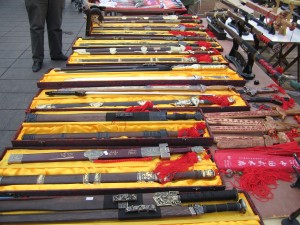NCPH and international public history
06 August 2014 – Nicholas Sacco

International Federation for Public History / Fédération Internationale pour l’Histoire Publique logo. Credit: IFPH/FIHP blog
Public historians attending a National Council on Public History (NCPH) Annual Meeting during the organization’s first thirty years of existence (1979-2009) rarely benefited from opportunities to learn about or discuss public history practices beyond the borders of the United States or Canada. A glance at the conference program from the 2009 meeting in Providence, Rhode Island, for example, shows that little attention was given to any international topics beyond a few sessions addressing the need to devise strategies for working with international tourists to public history sites in the United States. Some Canadian scholars attended and participated in these annual meetings, but ultimately international scholars looking to promote their public history work or network with like-minded scholars during NCPH’s first thirty years regretfully lacked a strong platform in which to do so.
NCPH recognized the importance of encouraging the growth of public history in other parts of the world and organized a Task Force in 2009 to consider ideas for the future. Out of this Task Force came the International Federation for Public History (IFPH), a membership organization dedicated to creating “international linkages between public historians and [promoting] the development of a worldwide network of Public History practitioners.” In addition to creating this international network of practitioners, IFPH also aims to exchange ideas on professional and academic best practices, teaching methods, and collaborative public history projects across nations.
The initial results since the establishment of the IFPH five years ago have been nothing short of remarkable. NCPH Annual Meetings have seen a steady increase of international topics discussed and a wider diversity of conference attendees due in large part to IFPH’s sponsorship of conference sessions, working groups, and roundtable discussions about international public history. This year’s meeting in Monterey, California, saw conference attendees from ten different countries and a host of discussions covering history and memory in Europe, community-based work with indigenous peoples in Canada, oral histories in the African Diaspora, political conflict at Guantánamo Bay, Cuba, and public history practices in China. IFPH will also be hosting its own conference in Amsterdam this October and a future meeting in Jinan, China.
Where does international public history go from here and what exactly do we mean when we talk about “internationalizing?” While I mostly study United States history and have a limited knowledge of international public history practices, I believe “internationalizing” public history starts with public historians across the globe engaging in a dialogue about the ways public history is practiced globally. My work in public history involves interpreting the “tough stuff” of US history–Indian removal, slavery, and segregation, for example–and I often wonder if there is room to learn from international public historians who are working to interpret their own “tough stuff” of imperialism, world war, and genocide. The international diversity of sessions at the NCPH 2014 Annual Meeting demonstrated to me the potential benefits of learning from colleagues in other parts of the world.
“Internationalizing” public history also challenges North American public history educators to compare the content of their curricula with the curricula of educators elsewhere. A comparative examination of public history programs in the Americas, Africa, Asia, Australia, and Europe could help public history educators prepare their students for international employment. Some programs in the United States, such as the University of Massachusetts Amherst, Arizona State University, and New Mexico State University, are actively training students whose scholarly interests extend beyond the United States for work in public history. Sometimes these programs even provide financial aid to their students to study abroad. As more US public history programs expose their students to international studies, claims that one must be an “Americanist” to be employable will hopefully fall by the wayside.
What can NCPH and IFPH do to help facilitate more conversations about international public history? What are the best non-US resources for public historians looking to expand their scholarly interests? Following the success of this year’s Annual Meeting, I hope we can continue to have conversations about these important questions and consider how international collaboration benefits all public historians.
~ Nick Sacco works as a Park Guide with the National Park Service at the Ulysses S. Grant National Historic Site in St. Louis, Missouri and has been a practicing public historian since 2010.





Thank you very much for this informing text! Currently I am in the process of writing my Bachelor’s thesis at a Liberal Arts College in Middelburg, the Netherlands. My topic fits very well into the thoughts on international public history that you present here. I am planning to write about in what way the practice of Public History can be used to look at the history of slavery in the Netherlands and more over, the representation or commemoration of this history. So; can the ideas and theories of Public History simply be copied and used in the Netherlands or does something have to change in order to do so?
As I am quite new to the field and mainly took courses in social history, sociology and philosophy I am currently reading up on the core ideas and theories of Public History. Including several articles from the Public Historian, books by James Horton and Ana Lucia Araujo. Would you have any advice for me on what to read or to look at?
Thank you very much!
Best,
Inge Zwart